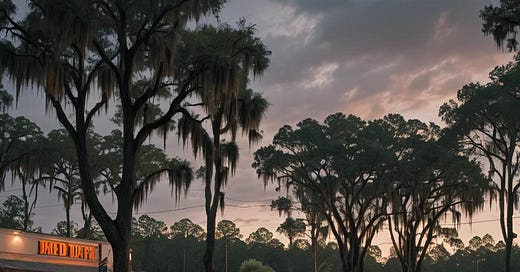When Home Depot Comes Knocking: What Could This Mean for Lakewood Ranch?
Not that I need another excuse for a weekend project…
Home Depot has set its sights on Lakewood Ranch, eyeing a 15.86-acre plot at 5504 Lorraine Road, near Rangeland Parkway and just north of State Road 70. They've submitted a request to rezone the land from general agricultural to planned development commercial. But for many locals, this isn’t exactly a “welcome to the neighborhood” moment.
At first glance, having a Home Depot nearby might seem like a DIY dream come true—no more long drives across the county for a box of nails or a gallon of paint. But before we start imagining the convenience of weekend projects made easy, it’s important to pause and consider what this really means for our community. Across the country, when big-box stores like Home Depot move in, they often bring more than just well-stocked shelves—they also bring challenges. Let's explore what could be in store for Lakewood Ranch if Home Depot establishes a presence here.
Traffic Jams and Close Calls
First on the list is traffic. If you think our roads are busy now, just wait until a Home Depot opens. The arrival of a big-box store is like an open invitation to gridlock. Imagine what’s now a relatively peaceful drive down Lorraine Road turning into a congested mess of bumper-to-bumper traffic, honking horns, and stressed-out drivers trying to navigate a sudden influx of cars, delivery trucks, and oversized construction vehicles. The roads here weren’t designed for this kind of load, and with increased accidents and longer commutes, the simple act of getting home from work could become the most stressful part of your day.
Nature's Eviction Notice
Next up is the environmental impact. The land that Home Depot wants to transform is currently zoned for residential use, meaning it’s more about trees and wildlife than concrete and commerce. Rezoning it for commercial use could lead to the kind of habitat destruction that makes Mother Nature want to pack her bags. Other communities have seen their green spaces and wildlife habitats disappear when developments like this move in, and the long-term environmental effects are often dire. We could be trading the natural beauty that makes Lakewood Ranch special for yet another sprawling parking lot.
The New Neighbor Nobody Asked For
Let’s talk about the vibe—because that matters. Lakewood Ranch is known for its quiet, residential feel, complemented by small businesses and local charm. Now, drop a Home Depot into the mix, and that cozy atmosphere might start to feel more like a busy industrial zone. It’s the kind of change that can lower property values and push small businesses to the brink, especially when they can’t compete with the prices and convenience of a giant like Home Depot. We’ve seen it happen elsewhere, where big-box stores move in and bulldoze the character right out of the neighborhood.
Noise, Lights, and Sleepless Nights
If there’s one thing you can count on with a big store like Home Depot, it’s noise and light pollution. Those of you who cherish the peace and quiet of a rural setting might find yourselves contending with the hum of early morning deliveries and the glare of parking lot lights that never seem to turn off. Imagine trying to enjoy your backyard with the background noise of forklifts or struggling to get a good night’s sleep with your bedroom bathed in light as if under a perpetual full moon. Other communities have dealt with this, and it’s not exactly a recipe for a peaceful life.
Time to Stand Up and Speak Out
With all this in mind, it’s no wonder that the residents of Lakewood Ranch are gearing up to push back. Now is the time to get involved—attend those public meetings, raise your voice, and make sure your concerns are on the record. Whether it’s signing petitions, writing letters to local officials, or organizing protests, every effort counts. This isn’t just about stopping a store; it’s about protecting the community you call home.
The Bottom Line
While Home Depot might bring some conveniences, it’s crucial not to overlook the potential downsides—especially in a residential area like Lakewood Ranch. History teaches us that developments like this can bring a host of problems, from traffic and environmental concerns to the erosion of community character. By getting involved and making our voices heard, we can guide this development in a direction that benefits the community rather than undermines it.
Lakewood Ranch, this isn’t just about a new store—it’s about the future of our community. Let’s protect what makes this place special and ensure any development aligns with our best interests. Now’s the time to speak up and keep our neighborhood the place we all love.
Looking at the Bigger Picture: Lessons from Other Big-Box Battles
Lakewood Ranch isn’t the first community to face the prospect of a big-box store moving in. Across the country, similar proposals have sparked fierce debates, and the outcomes often serve as cautionary tales. Here are a few examples where communities faced the arrival of big-box stores, and what we can learn from their experiences.
Hadley, Massachusetts
- Issue: When big-box giants like Walmart and Lowe's wanted to set up shop in Hadley, the town was split. Residents worried about traffic congestion, the survival of local businesses, and whether their charming, small-town atmosphere could withstand the pressure.
- Outcome: Despite clear opposition, the stores were built. Traffic became a daily headache, and several local hardware stores couldn’t compete, leading to closures and job losses. The town’s character suffered, proving that bigger isn’t always better.
Bellingham, Washington
- Issue: A proposed big-box store on the outskirts of Bellingham raised concerns about urban sprawl, environmental degradation, and the survival of small businesses.
- Outcome: The store went up despite protests, bringing more traffic and a slow decline of local shops that couldn’t compete. The town shifted from a tight-knit community to a more commercialized area, showing how one big store can alter the fabric of a neighborhood.
Henderson, Nevada
- Issue: In Henderson, big-box stores were proposed for residential neighborhoods, causing an uproar over expected traffic increases, noise, and potential threats to local wildlife.
- Outcome: The stores were built despite opposition, leading to traffic snarls, constant noise, and vanishing wildlife. It was a stark reminder that development often comes at a steep environmental cost.
San Francisco, California (Bayview-Hunters Point)
- Issue: A big-box store was slated for Bayview-Hunters Point, but the community pushed back hard, fearing heavy traffic, the loss of local businesses, and environmental fallout.
- Outcome: After a fierce legal battle and public protests, the plan was scrapped. The site was transformed into a mixed-use development better suited to the community’s needs, showing that collective action can steer development in a positive direction.
Saugus, Massachusetts
- Issue: In Saugus, proposals to bring big-box stores into residential areas sparked concerns about traffic, noise, and the future of local businesses.
- Outcome: The stores were built, leading to chaotic traffic, struggling local businesses, and daily nuisances like noise and light pollution. It was a clear case of short-term gain for long-term pain.
The Takeaway
These stories highlight that big-box stores don’t just bring more shopping options—they bring big changes, often at the expense of local character and quality of life. For Lakewood Ranch, the proposed Home Depot could follow a similar pattern unless the community takes a stand. By learning from these examples, residents can better prepare themselves for the fight ahead, knowing that protecting their neighborhood’s charm and character is worth every effort. Now is the time to take action and ensure Lakewood Ranch doesn’t become another cautionary tale.







